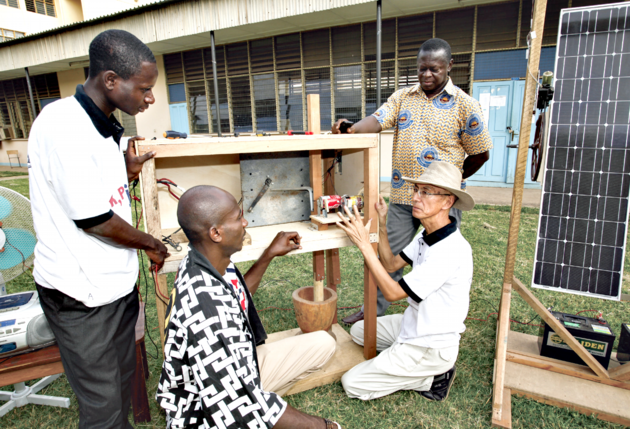1. Japanese Society and Japanese Citizens Deepening Their Ties with the World
Increasing the number of people both to and from Japan leads to stimulating the economy and promoting mutual understanding among different cultures. Based on this view, the Ministry of Foreign Affairs places a premium on facilitating the smooth entry and visit of foreign nationals in Japan and encouraging interpersonal interaction with people from foreign nations.
Although the number of foreign nationals entering Japan in 2011 decreased significantly from the previous year due to the Great East Japan Earthquake, however 7.14 million (9.44 million in 2010) people still visited Japan, which is approximately 1.4 times the number of visitors in 2000 (approximately 5.27 million). Furthermore, the number of long term foreign residents in Japan (registered foreign nationals) has decreased from a peak in 2008, following the Global Financial Crisis. However, at the end of 2011, approximately 2.08 million long term foreign residents were in Japan, which is approximately 1.2 times the number in 2000 (approximately 1.69 million).
Foreign nationals wishing to enter Japan are required to obtain a visa. Japanese diplomatic missions overseas issue visas to those foreign nationals who would nor be judged to harm the interests of Japan. In response to the increase of foreign nationals visiting Japan in recent years, the Ministry of Foreign Affairs has been working to expedite visa issuing procedures.
As for the rapidly growing ASEAN countries, Japan commenced the issuance of multiple-entry visas to visitors from Thailand in June 2012 and to visitors from Malaysia and Indonesia from September.
Furthermore, in 2011 Japan commenced issuing Okinawa multiple-entry visas to Chinese tourists on condition of visiting Okinawa. Additionally, Japan commenced the issuance of Tohoku multiple-entry visas in July 2012 on condition of visiting one of the three prefectures in the Tohoku region (Iwate, Miyagi and Fukushima Prefectures).
As Japan faces low birth rate, aging and declining population not only attracting international tourists to Japan but also securing the human resources from both within and outside of Japan for supporting the Japanese economy has become more and more important. Against this backdrop, since 2005 the Ministry of Foreign Affairs has held international symposiums and workshops on acceptance of foreign nationals and their integration, to provide opportunities for discussion on potential issues and their countermeasures, and to encourage participatory national discussion on the topic.
Today the connection between Japanese people and the rest of the world has become closer than ever. Consequently, developing “All-Japan” diplomacy, where the strengths of non-governmental actors are utilized, has become more important. For example, the importance of NGOs as bodies providing assistance to developing countries has become more important in recent years with the increasing public interest in international cooperation. The Ministry of Foreign Affairs positions NGOs as crucial partners in international cooperation and as such has been striving to enhance relationships with NGOs in promoting international cooperation. Japanese NGOs provide thorough assistance tailored to local residents’ needs for poverty reduction and humanitarian assistance, in Asia as well as in other regions of the world including Africa and the Middle East. NGO operations are not limited to providing on-site assistance, but they are also engaged in a wide range of activities such as forming NGO networks and making policy recommendations in various fields like human rights, education, health, and the environment by making the most of their expertise on subjects such as the present condition of developing countries.
Participants of JICA Volunteer Programs such as the Japan Overseas Cooperation Volunteers (JOCVs) and Senior Volunteers (SVs) are also important players in international cooperation. They put themselves in the shoes of the locals and earnestly working toward the resolution of problems faced by developing countries. These volunteers are visible representations of Japan’s ODA in developing countries and widely appreciated around the world, playing significant roles in promoting economic and social development of these countries, and fostering mutual understanding and friendship between Japan and developing countries. These programs gain further significance as the knowledge and experience of those returning volunteers are brought back to Japanese society. Moreover, in this age of globalization of corporate activities, Japan has been providing support for the efforts made by SMEs and other actors to develop internationally competitive personnel through JICA’s volunteer programs. One example of this was the establishment of the Private Sector Partnership Volunteer system (2012), which is designed to meet the needs of SMEs seeking to expand their business overseas.
Local Governments and communities play a major role in developing positive international relations in a wide range of fields. In recent years, local governments, organizations and community members have been involved in active and wide-ranging international exchange. Local governments and communities are playing an extremely important role in diplomacy from the perspective of fostering international mutual understanding, developing relationships of trust and strengthening Japan brand.
The Ministry of Foreign Affairs regards local governments and communities as important partners in promoting diplomacy and aims to work with them to direct all-Japan efforts toward enhancing the country’s comprehensive diplomatic capacity. To this end the Ministry of Foreign Affairs implements various cooperative measures with local governments and other concerned parties, placing particular emphasis on (1) communicating the attractions of local communities to the world, (2) supporting the internationalization of local communities, and (3) providing a broad range of information on international exchanges. The Ministry of Foreign Affairs has been undertaking various measures, particularly in order to contribute to supporting communities in countering damage by harmful rumors resulting from the Great East Japan Earthquake, and supporting for revitalization of local industry and local economies as well as assisting Japan’s efforts in “open reconstruction.”

A “Fufu” cooking machine utilizing solar power generation invented by a member of Senior Volunteers. “Fufu” is a staple diet which is made from banana and cassava (in Ghana, Photo: JICA)